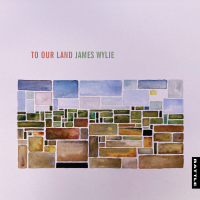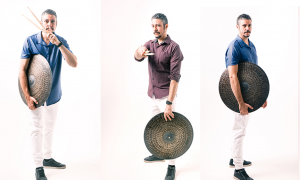Home » Jazz Articles » Interview » Us3: The Struggle Continues
Us3: The Struggle Continues
Us3 albums have always been about marrying the technology that
 In 1992 Geoff Wilkinson produced the groundbreaking jazz/hip-hop crossover track "Cantaloop (Flip Fantasia)," gaining international recognition with his Us3 project. Fourteen years and six albums down the line he's still going strong, but it could all have been very different. Here he tells AAJ contributor Frederick Bernas about the highs and lows of his long and convoluted musical journey.
In 1992 Geoff Wilkinson produced the groundbreaking jazz/hip-hop crossover track "Cantaloop (Flip Fantasia)," gaining international recognition with his Us3 project. Fourteen years and six albums down the line he's still going strong, but it could all have been very different. Here he tells AAJ contributor Frederick Bernas about the highs and lows of his long and convoluted musical journey.
For a man whose achievements are so widely respected, Wilkinson comes across as a genuine, open person—not at all pretentious or arrogant. I met him at London's Jazz Café, where Us3 played two nights, launching a European tour through September and October 2007. We started at the very beginning, discussing how he first got into producing. "I was actually managing a studio called The Ark, Wilkinson recalls, "which was owned by Rick Buckler, drummer for The Jam, in the late '80s. It was one of the first studios to have an Apple Mac, and whenever there was any downtime I started playing around with it. I was always intrigued by sampling and programming.
That kind of situation is hard to imagine now, so how does he think technology has changed the way producers work? "The first Us3 album was made with an Atari computer running an Akai S900 [laughs], Wilkinson responds, "but that was state of the art in 1992. It's ridiculous what you can do now with all the plug-ins available in Logic—my laptop is probably ten times as powerful as the whole studio that made the first album. Has it helped him expand creatively? "Us3 albums have always been about marrying the technology that's available with live playing. With all the modern developments, it's become one of those things where you're only limited by your own imagination.
During the 1980s Wilkinson was on a mission to "demystify jazz, and drew inspiration from working with a DJ named Baz The Jazz: "This guy was the best jazz DJ I've ever heard; he had a totally new attitude, really into breaking down barriers. The pair were heavily involved in the jazz-dance craze of the time in London, but Wilkinson was equally interested in the growing hip-hop scene—"I was discovering the two things at the same time and sooner or later I was going to put them together.
Sure enough, in 1990 he produced a 12-inch white label featuring Jessica Lauren on piano and MC Honey B, called "Where will we be in the 21st Century?" and took copies to every record shop in the West End. Wilkinson had already "been in just about every A&R man's office there was to visit in London with previous material, but this time he attracted the attention of a new independent label called Ninja Tune. Following the invitation to record a track for them, he produced "The Band Played The Boogie, sampling Grant Green's "Sookie Sookie. It was playlisted on KISS FM and that was the start of something big.
"I got a call from EMI Records, Wilkinson explains. "They'd heard it on the radio and recognized the Blue Note sample. I went to the first meeting knowing full well the sample hadn't been cleared, so I didn't know whether they were going to sue me or whether they liked it. The A&R guy was called David Field, and when he opened the office door he was smiling, so I had a good feeling. We discussed the whole jazz and hip-hop thing and I had one of those 'seize the day' moments—I asked to have the entire Blue Note back catalogue as a sampling resource. I said it would be a radical thing to do, but very in keeping with the Blue Note spirit.
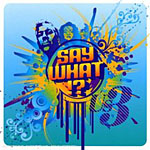
The President of Blue Note, Bruce Lundvall, had also received a copy of the white label release and cautiously gave Wilkinson the chance to record a couple of demos in March 1992. "One of the demos I recorded was 'Cantaloop,' Wilkinson continues, "the other song didn't even make it to the first album—that's how close it was! That was what got me the deal, but it was still only for three singles and one album. In October 1992 Hand on the Torch came out in Japan and parts of Europe, going on to be the first Blue Note record to sell over a million copies—"That's when the three single deal suddenly turned into an eight album deal, Wilkinson explains.
Perhaps this all seemed too good to be true. It was. Before the second album—entitled Broadway & 52nd—came out in 1997, David Field lost his job, and this left Bruce Lundvall to oversee the release: "It was great talking to him every week, but it was less than ideal having a sixty year-old working on what was really a rap record, says Wilkinson. This turned out to be the least of Wilkinson's worries. "I split with my manager and got a new one, who took one look at the recording contract and said I was actually out of contract because they'd missed the option date. The record company was supposed to take up the option for the third album by a certain date, but it hadn't been done. So I was never actually dropped from Capital/Blue Note. It was ridiculous.
Losing a lucrative and hard-earned contract on such a careless technicality was a crushing blow, but Wilkinson was rescued by David Field, who had moved to Sony Records and was working for a subsidiary label called The Work Group. "David signed me up straight away, Wilkinson explains. "Normally contracts are for one album at a time, with the options on the side of the record label, but he gave me a two album firm deal. This was very important bearing in mind what had happened at Blue Note.
Luck, however, was still refusing to work with him. "While I was mixing the third album there was an almighty blow-up within Sony and The Work Group was dismantled, Wilkinson recalls. Nineteen out of twenty-one acts on the label were dropped. But because I had a two album firm deal it became really complicated: I'd just finished an album and I wanted to take it somewhere else, but they wouldn't let me. So we ended up threatening that we'd just sit there and eventually they'd have to pay me an advance for what would be the fourth album, even if they hadn't released the third. This took eighteen months and twenty-five thousand pounds in legal fees, but eventually they let me have the album for free.
He then licensed the third album, An Ordinary Day In An Unusual Place, to Universal in Europe and Toshiba/EMI in Japan, and it was released in 2001. But, as if the story couldn't get any worse, personnel changes at Universal meant Us3 got dropped and it was back to square one for Wilkinson and his ambitious ideas. "I'd done three albums in ten years and I was fed up of the internal politics, he says with a sour note in his voice. "It wasn't my fault; it was like a merry-go-round of personnel within the companies. So I decided to use the money I'd made to just make an album and then see what to do with it afterwards.
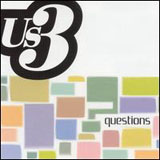
The subsequent disc, Questions, was licensed to Toshiba/EMI in Japan and independently released in Europe in 2003. "Now I've done three albums in three years, which is more like the kind of output I need to have, emphasizes Wilkinson. "I had a burst of energy, a lot of ideas to get out. The frustration of all that time has come out in the last three years.
Musically speaking, the three albums have shown a significant evolution of Us3's sound. On Questions, Wilkinson abandoned the Blue Note samples which had become deeply embedded in An Ordinary Day, opting for Latin beats and some elements of the nu-soul movement in an adventurous fourteen-track set. Schizophonic (2006) and Say What!? (2007) bring out a lot more of the live sound Us3 had been developing in months of relentless touring—"The live bands have had various incarnations, illustrates the producer, "It's quite ironic that the last two albums have been very influenced by the gigs we've been doing; it's kind of turned everything around, which I think is part of normal development and evolution.
Another new idea Wilkinson threw into the equation with Say What!? was the recent trend of R&B becoming "a lot grittier, like Rich Harrison's productions for Beyonce and the last Christina Aguilera album. He could detect certain similarities in their production with what he was doing, so on the suggestion of rapper Akil Dasan, who performed on the last two albums, he recruited the young Parisian singer Adeline.
Adeline features on the single, "Say You Belong To Me," and Wilkinson has an unfortunate tale about the track. "I hired a radio promoter, who took the song to Radio One, KISS, 1Xtra and places like that. A producer from 1Xtra actually told him that if the song was by an established R&B artist, or even a new artist, it would have gone straight onto the playlist. So why didn't that happen? "I think they've got an inbuilt attitude problem with Us3. Because 'Cantaloop' is what I'm known for, I'm bracketed as being hip-hop jazz or acid jazz or whatever. They put you in a bag and they don't let you get out of it, which is ridiculous because it doesn't allow you any scope to develop as an artist.
This story recalls the recent case of Soweto Kinch struggling to get his latest album, A Life In The Day of B19: Tales Of The Tower Block (Dune, 2006) (which also contains strong hip-hop elements), stocked in the urban music section of record stores as well as the jazz area. "Have you read his blog? Wilkinson asks; "When I read it I just laughed. It's exactly the same issue I had: imagine putting out a hip-hop record on Blue Note in America in 1993-94, which was absolutely unheard of. We had a major problem getting retailers to stock it in the hip-hop section rather than just the jazz section. Ultimately we won, but that was because it got a lot of radio play and they were forced to respond.
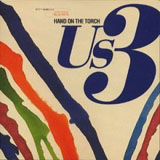
He goes on to talk about the fascinating wider point that "radio over here is becoming a bit more like radio in the USA, where it's compartmentalized, and I don't think that's healthy.
"I don't think that encourages any cross-pollination of styles, which is something the UK's always been good at. A lot of musical genres come out of this country because people are willing to experiment with other things. They've grown up with Radio One playing all sorts of different music, which I don't think can be underestimated compared to major radio in the States. There's no such thing as any station that would play a rock record next to a hip-hop record next to an R&B record next to a house record. You just wouldn't get that over there because it's all too segregated. And there's a danger of that happening here now, with more and more channels becoming available on TV and radio and everything becoming more specialized. I don't think it's healthy.
Despite this tirade, Wilkinson remains optimistic. "I'm not unhappy as to where I am now, he states thoughtfully, "but it's frustrating that I'd like to be able to take it to another level which is proving difficult with an independent label. So what would he do if a major record company came knocking again? "I'd like to think I'd say no but I've seen the other side of it now and I think there's a real glass ceiling you can reach putting things out independently. In the last three years I've learnt more about how the industry works than the previous ten before that; I've become a small businessman in many ways. However, I still don't think I would do it unless somebody put a ridiculous sum of money in front of me—which I know isn't going to happen because major labels don't do that nowadays.
Wilkinson also has bright words about the future of jazz and hip-hop, in his brand of fusion and as separate genres. "Both types of music are experimental and they are both heavily influenced by other types of music. Certain collaborations change the face of both types of music; for example, Dizzy Gillespie writing 'A Night in Tunisia' and working with Cuban musicians probably upset a lot of purists at the time, but that's the kind of thinking I like. Jazz and hip-hop aren't afraid to liberally borrow from other types of music, they're both in a constant state of change and it's only natural they would come together in different forms. I think there's a lot more to come.
"I also think the jazz scene in London is probably the healthiest it's ever been, and the same goes for British hip-hop.
align=center> Us3 at the 2007 Black Sea Jazz Festival
Us3 at the 2007 Black Sea Jazz Festival
So how does the fertile state of his two dearest genres relate to immediate and future plans? "I'm hoping to put the next album out around September-October 2008, I've already been working on potential tracks and putting a few grooves together. I haven't decided what vocalists to use yet, but I have a few ideas, he continues mysteriously. "I'm totally open to new possibilities as well, it's all in the developing stages; anyone can contact me through the MySpace page—nobody else runs it for me.
Looking to round things off after a revealing thirty-minute discussion, when asked if he has any personal highlight from the last few years, Wilkinson pauses to think. "The fact I'm still here, he says with a chuckle. "It would have been very easy to just stop because of the Sony thing, and I did think about it, but I refused to lie down and it's worked out well now. This is going to be the seventh Us3 album—nearly hit that magic eight!
Selected Discography
Us3, Say What!? (Us3, 2007)
Us3, Schizophonic (Us3, 2006)
Us3, Questions (Us3, 2004)
Us3, An Ordinary Day In An Unusual Place (Universal, 2001)
Us3, Broadway & 52nd (Blue Note, 1997)
Us3, Hand On The Torch (Blue Note, 1993)
Photo Credit
Courtesy of Us3 on MySpace
Tags
PREVIOUS / NEXT
Support All About Jazz
 All About Jazz has been a pillar of jazz since 1995, championing it as an art form and, more importantly, supporting the musicians who make it. Our enduring commitment has made "AAJ" one of the most culturally important websites of its kind, read by hundreds of thousands of fans, musicians and industry figures every month.
All About Jazz has been a pillar of jazz since 1995, championing it as an art form and, more importantly, supporting the musicians who make it. Our enduring commitment has made "AAJ" one of the most culturally important websites of its kind, read by hundreds of thousands of fans, musicians and industry figures every month.









